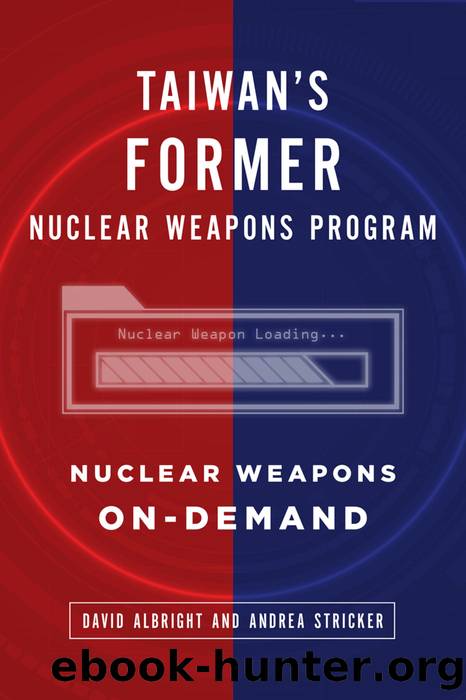Taiwan's Former Nuclear Weapons Program by David Albright

Author:David Albright
Language: eng
Format: epub
Publisher: Institute for Science and International Security
Published: 2018-09-25T16:00:00+00:00
Chang’s Recruitment and Spying
In his Mandarin-language book, Nuclear Weapons! Spy? CIA: Interview Record with Chang Hsien-yi, Colonel Chang writes that the CIA had likely been interested in him since sometime when he was an undergraduate at the military Chung Cheng Institute of Technology and Science (now called the National Defense University), which he attended from 1963 to 1967. The CIA probably followed his trajectory while he was studying nuclear engineering in the United States, particularly while he was earning his Ph.D. in nuclear engineering from 1972 to 1976.7 He was first contacted by the CIA in 1975, like many from Taiwan, but stated that he declined their attempts to recruit him. In 1976, he returned to Taiwan to take a senior position as a nuclear engineer in INER’s Reactor Dynamic Control Simulation Group, rising rapidly through the ranks. Part of that rise, according to Chang, was because he was a major proponent of Taiwan pursuing nuclear weapons development, a fact that was widely known at INER.
Chang wrote in his book that the CIA likely followed students’ careers first rather than attempting to recruit them while studying abroad, a time when they would likely report the contact and their future direction was uncertain.8 Once he returned to INER, while attending U.S. conferences, he and many of his colleagues would receive random phone calls to their hotel rooms or in-person approaches from people who claimed to work for companies and wanted to meet over dinner to discuss employment. Most of the Taiwanese scientists were suspicious. Usually they declined.
Former military Chief of the General Staff General Hau Pei-tsun, the person who would oversee a resurgent nuclear weapons program on behalf of the military in the 1980s, wrote in his published diary about CSIST scholars being approached for recruitment by the CIA while studying in the United States, to serve as informants back home. Hau kept a daily diary that he published in 2000 in Mandarin, which reveals much about the internal dynamics and events relating to the nuclear program throughout the 1980s.9 The diary is a key source apart from Dr. Chang about events during that time period, since U.S. diplomatic cables remain classified. Hau made clear that the leadership was very aware that people in the program were being recruited, and in response, Taiwan ran extensive counterintelligence efforts. Hau wrote in July 1983 that CSIST researchers who went to study in the United States confessed to the CIA trying to recruit them as spies. Dr. Chang confirmed that Hau was concerned that Taiwan’s missile experts were providing secret information about the program to the Americans.
Recruitment into spying for the PRC was always a major source of concern for Taipei. The Chinese had reportedly penetrated the Kuomintang, or KMT, the Nationalist Party led by President Chiang, and many Chinese spies were believed to be part of Taiwan’s political elite. (See sidebar on Chinese cooperation with United States in penetrating Taiwan’s nuclear program).
Chang says his initial opening to the CIA started in 1981 or 1982 after an approach at a U.
Download
This site does not store any files on its server. We only index and link to content provided by other sites. Please contact the content providers to delete copyright contents if any and email us, we'll remove relevant links or contents immediately.
| Arms Control | Diplomacy |
| Security | Trades & Tariffs |
| Treaties | African |
| Asian | Australian & Oceanian |
| Canadian | Caribbean & Latin American |
| European | Middle Eastern |
| Russian & Former Soviet Union |
The Secret History by Donna Tartt(16624)
The Social Justice Warrior Handbook by Lisa De Pasquale(11489)
Thirteen Reasons Why by Jay Asher(7788)
This Is How You Lose Her by Junot Diaz(5773)
Weapons of Math Destruction by Cathy O'Neil(5037)
Zero to One by Peter Thiel(4824)
The Myth of the Strong Leader by Archie Brown(4789)
Promise Me, Dad by Joe Biden(4447)
Beartown by Fredrik Backman(4419)
Stone's Rules by Roger Stone(4416)
How Democracies Die by Steven Levitsky & Daniel Ziblatt(4399)
The Fire Next Time by James Baldwin(4343)
100 Deadly Skills by Clint Emerson(4079)
A Higher Loyalty: Truth, Lies, and Leadership by James Comey(4033)
Rise and Kill First by Ronen Bergman(4012)
The David Icke Guide to the Global Conspiracy (and how to end it) by David Icke(3883)
The Farm by Tom Rob Smith(3872)
Secrecy World by Jake Bernstein(3782)
The Doomsday Machine by Daniel Ellsberg(3731)
